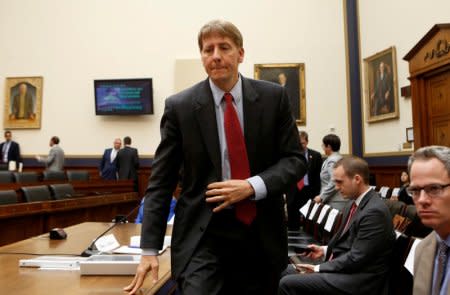Cordray resigns from U.S. consumer agency, triggers political showdown

Thomson Reuters
By Pete Schroeder
WASHINGTON (Reuters) - Richard Cordray, the director of the U.S. Consumer Financial Protection Bureau, formally resigned on Friday and named a deputy director as his replacement, setting the stage for a political and legal battle over the regulator's leadership.
Democrat lawmakers are eager to preserve the regulator for as long as possible while Republicans want to put in place new leadership to chart a drastically different course.
The six-year-old bureau has policed consumer financial markets, drafting aggressive rules curbing products like payday loans, while issuing multimillion dollar fines against large financial institutions like Wells Fargo.
But Republicans have consistently complained the agency is too powerful and lacks oversight from Congress on its operations, and they are eager to take control.
The succession plan has never been tested, with Cordray as its first and only full-time director.
Cordray had previously announced plans to resign by the end of November. In a statement to staff, he said that Leandra English, the CFPB's chief of staff, had been named deputy director and would take over as acting director of the agency upon his exit.
However, the White House has already said it plans to name its own interim leadership at the regulator, and President Donald Trump is unlikely to prefer a long-serving Cordray deputy for that role.
Trump has pushed to ease regulations on businesses, including the financial sector, a stance seemingly at odds with Cordray's more aggressive regulatory approach.
Earlier this month, White House deputy press secretary Raj Shah said that the administration "will announce an acting director and the president's choice to replace Mr Cordray at the appropriate time."
Trump is expected to attempt to name an ally to head the agency on an interim basis, such as Office of Management and Budget Director Mick Mulvaney, who would then delegate the day-to-day running of the bureau to a deputy, according to two sources familiar with the situation.
"This has the potential for becoming very ugly," said Alan Kaplinsky, who heads the Consumer Financial Services Group for Ballard Spahr LLP.
There are competing theories in Washington as to who can name Cordray's replacement. Democrats point to language in the Dodd-Frank law that created the CFPB, stipulating the deputy director replaces the director when he or she leaves.
But others say a separate law governing federal vacancies gives Trump power to name someone elsewhere in the administration to that role temporarily, while the White House identifies a full-time nominee who would be confirmed by the Senate.
(Reporting by Pete Schroeder; Editing by Chizu Nomiyama and Rosalba O'Brien)
See Also:

 Yahoo News
Yahoo News 
